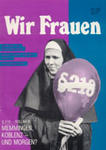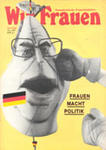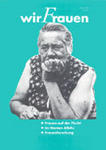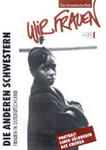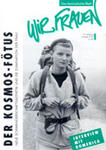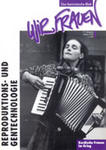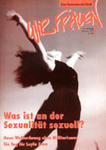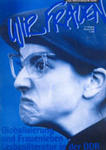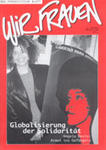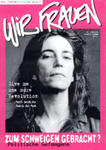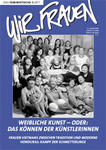Wir Frauen (Magazine)
type=digital_archives
Wir Frauen, a volunteer produced magazine, represents more than 25 years the same questions: Who benefits from the relationships? Who creates the conditions? Who pays the price? How can women resist, here and elsewhere? Where and how can they realize their ideas and concepts of life, their rights to self-determination and participation?
The Wir Frauen is published four times a year, daily circulation is 1,500. "Good and unbelievable that you are still there," we hear from some feminist "old rabbit" - on the more traditional table 1, May in Dusseldorf.
What motivates these women to publish free of charge four times a year, the WE WOMEN?
"For me, the editorial WE WOMEN became after my resignation from the SPD 1993 my political home. Here I met women who demonstrate the local and global contexts of poverty, violence and migration repeatedly airing guise of concealment of cause and effect and shall designate the naked truths. "(Elke Boumans-Ray)
"In particular I find the great common work in our office. It is professional, committed, constructive, chaotic fun. The self-planning of the magazine with the topics that interest us and which we believe they are other interesting, is a very satisfactory position in addition to the political impact. " (Marion Gaidusch)
"I particularly like the work on each priority area. She is always occasion to approach a topic of my interest from various sides, ask questions and do research, discuss and relate ultimately positions. That this understanding and wanting to move ends up having to earnings and four times a year, a journal of it, still motivated further. Similarly, the echo of our readers. And last but not least: Inspiring, informative, beautiful, cooperation in the newsroom and with the many supporters. "
(Melanie Stitz)
"I make it incredibly important in the days of regimented freedoms of expression, an independent women's newspaper that is executing is not at the outward appearance, but again look closely, where women, despite their strengths, their networking services to their very good training and the many small Emancipation steps in the past thirty years are at a disadvantage remains structurally and personally. To create this public opposition to the thought and carelessness is important to me. "
(Gabriele Bischoff)
Beginnings: Women on the Rise
What are the roots of the magazine, the well-known authors such as Peggy Parnass, Jutta Heinrich, Erika Runge, Ingrid Strobl, Ellen Diederich, Gisela Steineckert uva may have? The WE WOMEN is closely related to the times of departure, the international solidarity movement, the West German history and the evolution of the women's movement. 1975 was a year of major events: South Vietnam surrendered, the U.S. superpower was defeated by a "peasants", Angela Davis was released, the Japanese Junko Tabei became the first woman climbed to the summit of Mount Everest, the German divorce law was the principle of fault and it was the "UN Year of the Woman", was proposed by the International equipped with UN special-status Democratic Federation (WIDF). The world was in motion, and the women in the midst of a number like never before. It established the International Year of Frau'75 initiative, which created the Democratic Women's Initiative (DFI, 1976).
The DFI-founders, various ideologies and political parties attach to understand in the broad sense as leftists, as feminists. They welcome the objectives of the UN Year of women, gender development - peace 'will, but to see action to declare - "No longer, but to act," reads the address of the governments and the media. The DFI is understood as an autonomous operation, independent of existing organizations and parties, and the exclusion of men in the group work. From the outset, it emphasizes the social context of discrimination against women in the FRG, but also the entire context of life in the struggle for female emancipation. Their topics include: work - peace - self-determination - will come later this environment. The DFI is pursuing the goal of a society in which women and men equiva entitled to live together, overcome patriarchal structures, the centuries-old oppression of women because of their gender, as well as any thing of the past exploitation and oppression of man. "
To facilitate communication among some 100 West German groups are the first DFI (from 1977) out mimeographed newsletters with topics like "Women in Fascist Women in the Resistance", "Equal pay for equal work, international solidarity (eg .) time with the Chilean women, child care, with stories and examples from the women's action.
In 1979, the calendar WE WOMEN added. The DFI-editors Florence Hervé and Elly Steinmann enjoy the support of many dedicated women who make their art, their wisdom and their knowledge available. In the preface of the first WE WOMEN calendar states: "We wanted to build on progressive traditions, who are known to far too few women, but also give examples from our time. Therefore, in our calendar, both the famous poet and physicist of world renown, as well as unnamed female textile workers their place, the French revolutionary as the Austrian pacifist who is Christian, like the Marxist, the American civil rights campaigner and the Soviet cosmonaut, British suffragettes as well as German for Streiterinnen women's suffrage and women in the resistance against fascism. Not a few have paid for their commitment with their lives. "
The success of the calendar is overwhelming - the first edition (7,000) is sold out within a month, it needs to be reprinted (28,000). It subsequently sold the calendar year up to 50,000 times in the Federal Republic. This success spurred the DFI and they encouraged women to think about a real magazine - both projects will continue to benefit from each other.
In 1980, the newsletter of the DFI is named WE WOMEN with the caption "Democratic Women's Initiative in 1982 and printed in a magazine with 20 pages. The layout is improved, paid attention to the selection of photos, plus the color cover: the quality of the magazine is up from now on constantly. Serves as editor of the DFI, registered as responsible editors are: Elly Steinmann and Florence Hervé.
The editors appealed to the political activists and the feminist, therefore, to those who were saying already: "Another world is possible - another world is necessary."
1979, NATO decided to deploy around 600 new medium-range missiles in Western Europe. From the outset, the DFI was with its various groups carrying part of the emerging peace movement. Thus we find in the first issue, the focus on women and peace. In her article about the "new women's peace movement" draws Lottemi Doorman stock of the many activities: the call of "Women in the Bundeswehr? We say "no" (1979), the first initiated by the magazine Courage anti-military and anti-nuclear Congress (late 1979), which - with 10,000 women - the first major demonstrations against any kind of service of women in the armed forces and against the new medium-range missiles (December 1980). In an article Dorothee Solle writes about the direct link between peace and emancipation; Renate Janssen sits down with the planned health safety law and explained the related civilian 'militarization, Gisela Kessler reports on trade unionists in the peace movement. In the first edition, there are also books written tips, news and information from the women's movement and a report on "Anti-Discrimination Act Hearing, a hearing initiated by the Ministry of Family Affairs, if the emancipation of women enshrined in the constitution by an anti-discrimination law would be better achieved in practice. ..
Subsequently all relevant issues can be found in the magazine, always consistently viewed from the perspective of women. Some key words: occupations, equal pay, peace and development, § 218, foreign women in Germany. WE WOMEN offers a discussion forum and reports on the many women's events of the 1980s, for example, the Rheinhausen Hattinger and women against the destruction of jobs in the steel sector. Special emphasis is placed on reporting by and about women in other countries and cultures. Thus the women's peace activities in Comiso and Greenham, the women's peace march from west to east, or the Women's Peace Tent in Nairobi, documented on the UN World Conference on Women, and the solidarity of the DFI projects in Vietnam, Nicaragua, South Africa and Namibia. At the UN World Women's Congress of the non-governmental organizations in Nairobi are more women to DFI.
The 90s: Backlash and turning
In the world and in Germany it has become colder, the socialist countries will collapse, in November 1989 fall of the Berlin Wall and with it, soon the GDR. The era of small reforms and the large movements is first passed. The design possibilities of margins have become tighter. Some women are withdrawing from politics and movement. The remaining operations will increasingly be held on the character of defensive battles. Many women's projects are now struggling to survive, breaking women's issues, so also the DFI structures: At a recent meeting of the National Coordination decided to resolve federal office DFI (DFI individual groups exist to date), and concentrate on magazine and calendar . Both projects continue to evolve in a different form - the calendar in a new publisher, and with a reinforced cast.
The magazine was in 1990 just before the off - her publisher with the favorable pressure conditions had gone bankrupt. Nights of dread, the day of discussion. Then the decision: eyes and go through - so quickly gets us no small. This conviction was based, as women in the editorial of issue 1 / 1990: "We need a radical-critical women's magazine, which addressed the entire context of life, sexist discrimination and denounces anti-democratic developments. An exercise journal that encourages women to their own interests and rights and the alternatives as possible showing. A magazine that is fun, and writes with subtlety the truth 'and disseminated, as it said the pioneers of women's press 200 years ago and tried. And a magazine that loses in addition to all the regional news and reports from city and country ever international vision and respect, which the West German women's scene across the problems of Third World women and calls for peace not only known for the domestic church. "
The journal continues to publish initially meant only four instead of 6 issues a year, now instead of 2 DM 4 DM per issue. The support of the subscribers said, very sure, the financial basis in fact against it. An Association was formed. Managing editor was Florence Hervé, an editorial advisory board became her passion is to tell: Renate including worm and Antje Olivier. Some walked, others were added as Ingeborg Nödinger, which was jointly responsible editor, Dodo by Randenborgh, Marion Gaidusch and Birgit Unger. A few more like Karin Bergdoll, Lissi Klaus and Hildegard Nickel supported the project.
And it actually worked: In 1992 came the WE WOMEN with the subtitle "the paper out feminist". In the nineties, she held up her head and survived. Some of you, says Stefanie Berg in her speech to the 20th anniversary of the magazine would have otherwise missed WE WOMEN much. It was the era of backlash and the first Gulf War, a time when increased right-wing attacks on foreign citizens, as Schleswig-Holstein, Heide Simonis, got the first and only prime minister within a province, which started the war in Yugoslavia, and marital rape was punishable .
Today, mastering: Crises
Of course there were and there are more small and big crises. The mid-90s, for example, was simply the air out - needed the office "fresh blood". The "boys" were: Elke Boumans-Ray, M. Mithu Sanyal, Sabine Schwabe, Gabriele Bischoff, later, Melanie Stitz, Mechthilde Vahsen, Doris Heeger, Sonya, and Sonya Vieten Klümper. They came with new ideas, fresh discussions and other perspectives.
Even today, the editors invite active in various networks targeted women from their respective environments, post an entry. In addition, women make up out of contact with the editors, for example because they are "homeless became" My wife project is in disarray, they leave the university and free themselves from the local context, or they have moved into the region. Accident and that they remain in most cases here, is mainly due to the substantive orientation of the WE WOMEN, as well as the open structure of the project.
In practice, it looks like this: The round of introductions at the first meeting could hardly be shorter. Any calls her names and told in a few sentences, how long and why they cooperate with the WE WOMEN what she likes to write, or what role she is responsible. For no more time left, because it is already in the planning of the next issue. The "new" are usually already been invited at the first meeting, a topic that interests you, write a review to investigate and obtain on-demand-all support, from Information to proofreading. From the beginning, they stand as an editor with the imprint. Sometimes revealed only in the course of the next meeting, which individual women or anything else driving it ". In the editorial is debated a lot of commitment on individual contributions - but not to matters of principle or political biographies.
Also attractive to many women: Each has the ability to regulate the extent of their involvement. There is no moral pressure and needs no justification, if taking a time out. Each even know what it is, along with a job and / or family work for volunteering. Each also knows that such a project can work only if it only appeals to what they can reliably provide. If ever so desirable, important, meaningful action can not be realized, then this is so. The editorial staff is doing what is possible and far from what would be needed.
Also, different ways of working will be respected. Some seek direct, personal contact, others become more involved in the discussions via email. Openness, trust and pragmatism, and advance the appreciation each contribution to the project have worked.
Adapt itself to the working methods of the realities of the project: Meaningful minutes, in which decisions are also explained in detail, are indeed complex, but are becoming increasingly important to involve all possible. New and quite the trend of "Open Space" - methods: Has a broader discussion is needed, then invites them to his home.
In recent years, the sword of Damocles hung from declining subscription numbers and lack of paid advertisements on the editorial: The threat from ever running alongside. Many women's projects are based on the unpaid commitment and are not institutionalized, can sing a song about it. Then calls the day his price and wants "to be managed."
Nevertheless, WE ARE WOMEN continue to make the time being, because the power is still sufficient, because readers write: "Well, there you are still" and "That's all I did not know before," because the editors for each new edition still retains its best, is their finest and are committed because more than 20 years tradition. They are convinced that women want to write then as now, critical reading and reading especially.
The magazine benefits from the diversity of the makers
The editors are between 30 and 60 years who love women who love men who live alone and in shared apartments that have children working together and raising them alone, in the social field and in offices, entrepreneurs and journalists, including academia, law firms and insurance companies, write books, paint pictures and climb mountains. They come from the socialist, trade union, fascism and international solidarity movements, and from the new women's and lesbian movement and the § 218 motion. They are atheists and believers, both internationally and well networked with other initiatives and movements.
The topics in WE WOMEN today:
Conditions of exploitation and imperialist war. Racism and sexism. Neoliberal Globalization and the waste of environmental resources. The relentless commercialization of our desires and needs. Male violence. A public increasingly misanthropic discourse - and related practices, compared to women (RTL & Co show her in various program formats almost exclusively as "stupid meat"), to economically disadvantaged (in times of Hartz IV), compared to refugees (Schily speaks cynically of "Welcome Centers "in North Africa). Culture and literature reviews as well as ideas about women's projects.
The responsibility is now - "passed without a generation gap - the" younger Gabriele Bischoff Stitz and Melanie are now the responsible editors. For the future, the editors are ambitious task. WE WOMEN should be more than feminist newspaper. More frequently, the editors wish to organize events and even more frequently present at national meeting women as peace activists and Committed. They are working on a dedicated website. Especially with women's projects in the east of the Republic they want to network and gain them even more young women to their cause: as readers and as editors.
Melanie Stitz, Gabriele Bischoff and Florence Hervé

